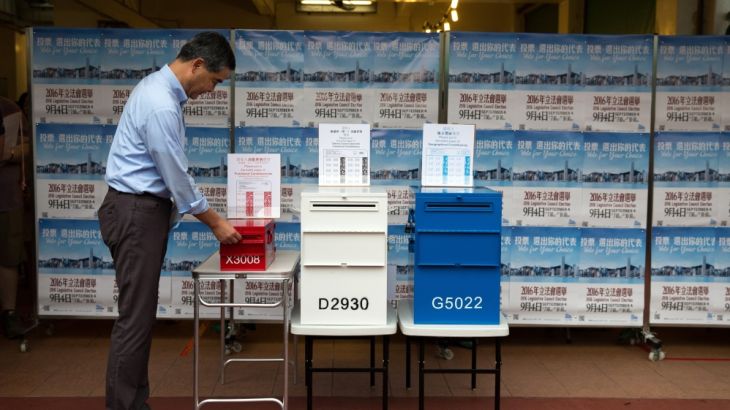Hong Kong votes in first major election since protests
Record turnout in Hong Kong legislative election as anti-Beijing sentiments increase.

Hong Kong saw a record number of voters turn out for the first major election since pro-democracy street protests rocked the Chinese-administered territory in 2014.
An hour before polls were scheduled to close at 1030pm local time (14:30 GMT) on Sunday, about two million people, or some 52.57 percent of registered voters, had cast their ballots, according to government data.
Even after the official closing time, some were still waiting to enter polling stations to cast their votes, local media reports said.
Hong Kong’s previous election saw 1.8 million people vote.
The government said the full results are expected on Monday, according to DPA news agency.
The vote is for a 70-seat legislative council in which Hong Kong’s pro-democracy opposition is hoping to maintain a one-third veto bloc against their better mobilised and better funded pro-Beijing and pro-establishment rivals.
If the outcome favours pro-democracy candidates, it could pave the way for a fresh round of political confrontations over Beijing’s control of the territory.
In July, six pro-democracy election candidates were disqualified from the election by the Hong Kong government on the grounds that they supported independence from China, even after some were forced to sign a pledge that Hong Kong is “inalienable” Chinese territory.
“We don’t want our next generation to be slaves of the Chinese Communist Party,” said Edward Leung, one of those disqualified who campaigned for a replacement candidate in an open-top bus and addressed cheering crowds on the streets of Hong Kong with a loudhailer.
“It’s a revolution of this era,” shouted Baggio Leung, of Youngspiration, who was running on Leung’s vacated ticket.
Hong Kong: Rooftopping for freedom and disobedience
The pro-democracy vote, though, risks being split by the emergence of a new generation of radical activists who are competing with moderate mainstream parties to challenge their pro-Beijing rivals.
“Joining the fray are those young radical groups who sprang up after the protest movement, some of whom are calling for outright independence from mainland China. That is adding a whole new dimension to this election,” Al Jazeera’s Rob McBride, reporting from Hong Kong, said.
“The protests against Beijing have really raised the temperature here.”
The city’s widely unpopular Beijing-backed leader, Leung Chun-ying, cast his ballot earlier on Sunday and urged the public to turn out and vote.
Outside the polling station where he voted, a small group of protesters demanded that Leung step down
“Our election is a democratic election,” Leung told reporters.
“The democracy in the election is reflected by the free choice of voters; they do not need to be told who to vote” for, he said.
The growing calls for Hong Kong’s independence highlight frustration among residents, especially the young, who are chafing under Beijing’s tightening hold.
A spate of incidents, including the disappearance of five Hong Kong booksellers who later resurfaced in mainland Chinese detention, has aroused fears that Beijing is reneging on its promise of wide autonomy for Hong Kong under a “one country, two systems” framework, which was agreed in the 1997 handover from Britain.
At that time, Beijing agreed to maintain Hong Kong’s freedoms and separate laws for at least 50 years.